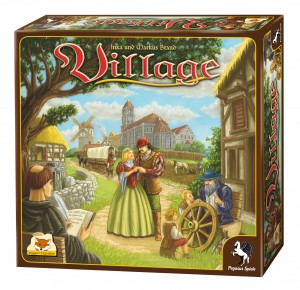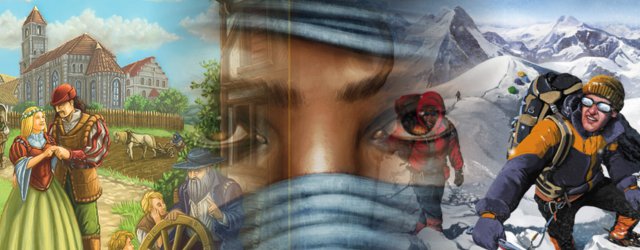Can you smell it? It’s that time of the year again. Smells of excitement. The nominees for the three German Game of the Year awards (Kinderspiel, Spiel and Kennerspiel des Jahres) have been announced today. I probably don’t have to tell anyone that the three “Pöppel” are still the most prestigous boardgame award in the world or how great the effect of winning is on a game’s sales numbers.
We’re starting today with a look at the nominees and the jury’s recommendations for Kennerspiel des Jahres (Gamer’s Game of the Year) and will present the Spiel and Kinderspiel later this week. This award was only introduced last year to give the more complex games their own category, separated from the more family oriented Spiel des Jahres – a controversial move at the time, but by now it’s widely accepted as a Good Thing™.
Lets have a look, and then let us know who’s your favourite for the Pöppel. Or do you think there is an obvious choice missing here?
The Nominees
K2

K2 is one of the oddities of all Spiel des Jahres awards: a game that was first released in 2010, but is nominated for the award this year. The explanation is, of course, very easy: the German edition was only released in 2012 by Heidelberger Spieleverlag, and the German edition is all that counts. Yes, we Germans are egocentric like that.
K2, designed by Adam Kaluza, is a mountain-climbing game – actually, K2 is a lot like the venerable Can’t Stop if you took out most of the luck, turned the strategy up, added bad weather and had only one top field to reach. So it’s not really like Can’t Stop at all, except that you are climbing upwards in both games. In K2 each player controls a team of two mountaineers ascending the titular mountain. You play cards each round to move up or down the mountain, but also to control your acclimatization because the weather will kill you if you’re not prepared. Changing weather and other players blocking your way do the rest to keep you from the top.
Targi

The theme for this years nominee seems to be “areas this meeple wouldn’t want to live in”. After a 8600m mountain we now go to the Sahara desert. Targi is a two-player game created by Andreas Steiger and published by Kosmos. To lead your Tuareg tribe to fame and fortune, you use a clever card selection mechanic where you place three of your tribesman around the card display and then take the cards where a row and a column thus controlled intersect. Each card either gives you goods to pay for tribe cards, or they are tribe cards paid for with goods and then placed in your personal display. Tribe cards are worth victory points, but they also grant other advantages and to make things harder may award extra points if you collect the right symbols in your display. The jury should also consider a special award for the most impressive eyes on the box cover.
Village

The theme of places-I-wouldn’t-want-to-live-in doesn’t quite continue with Inka & Markus Brand’s Village. Sure I’m a happy small-city-meeple, but I did grow up in a village that was disturbingly similar to the village in the game – including the level of technology. But we’re not here because of my biography – Village, published by eggertspiele and Pegasus Spiele, lets you write history on a small scale. The village chronicles, to be exact. Members of your family may learn a craft, work on the farm, sell goods on the market or even join the village council or the clergy. Or they may just travel to see the world. Each path of life lets you produce something and/or earn victory points. But doing something with your life costs time, and time is a finite resource for everyone: sooner or later, your family members will have to step aside for the younger generation to take over. Of the three nominees, Village is the most complex – lets see if the jury considers that a good thing.
The Jury Recommends
Ora et Labora
Pray and work – I don’t think that’s a winning strategy here. I’m honestly surprised that Ora et Labora is not on the nominee list, I was certain to see this title by Uwe Rosenberg there. As the abbot of a medieval monastery, you’re trying to build a production chain that will ultimately create books, relics and other things medieval monasteries created to gain victory points in the Vatican and let their abbot become pope one day. That is how it worked, right? Players place buildings for production on their own game board and send their three workers around to use those buildings and produce. But you’re not playing in complete isolation from each other. For a small fee, you can send workers to use other player’s buildings.
Friday
I said everything I wanted to say about Friedemann Friese’s solo game already in the review. I would repeat it here, but I’ve run out of thematic jokes, and repeating jokes just isn’t done.
Hawaii
Finally, a game that goes into the complete opposite direction of the trend: it’s about a place where I definitely would want to live. Wales. No, wait. Hawaii. I always mix these two. But the thing about buying tikis makes a lot more sense now. Your goal is to build the most beautiful village in all of Hawaii in order to impress the King. You walk around the lush forests of the island, buying houses and tikis and the occasional canoe or surfboard to go to one of the smaller islands. Everything you buy goes to your village where it scores points later. Everything in Greg Daigle’s Hawaii is very variable, the island is set up differently every time, the prices for things are different each round, you won’t be able to find a strategy that always works here.


I really thought we’d see Mage Knight on the list. But maybe the German release in May was just too late for this year.
I hope it’s on next year, totally deserves to be.
Good point. I haven’t played Mage Knight yet, but most people seem to absolutely love it. But even if the game was early enough, I’m not sure it would make the list, the jury tends to avoid games where you kill to win …